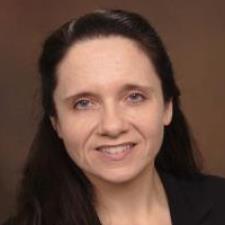Origin and duration may be one way of looking at these tenses, but I prefer to explain past tense and present perfect differently. Look at it this way: past tense is only used when the activity started and ended in the past, while present perfect is used when the activity started in the past, is ongoing or at least still possible today, and is likely to continue. Therefore, to visualize the difference, I often label the past tense as the 'closed door tense' (the door to the present and the future is closed), whereas present perfect is the 'open door tense', i.e. allowing an activity to exist in the past, present, and future (perfect!).
So in your sentence "She started playing the trumpet two years ago", the activity of starting happened two years ago; it's over. The activity of starting started and ended in the past. However, the present perfect sentence "She has been playing the trumpet for two years" uses playing as an activity, and that activity started in the past, is still practiced today, and is likely to continue in the future. Therefore, it's present perfect. Similarly, your other two sentences use the verbs "to become" and "to be". While becoming a teacher happened at a point in time in the past, being a teacher is something that started in the past, is still the case today, and is likely to continue in the future.
When constructing sentences, think about the type of activity. Is this something that started and ended in the past; then use past tense. Or is it something that started in the past, and is continuing into the present/ possibly into the future; then use present perfect. For example the verbs arrive and stay. How long does it take to arrive? It only takes a second, so it is something that could have started and ended in the past. Equally, staying somewhere could have started and ended in the past (then it's past tense), but it could have also started in the past and not ended yet (then it's present perfect):
He arrived yesterday. (started and ended in the past)
He stayed for two weeks last year. (started and ended in the past)
He has stayed for one week and he's going to stay for another week. (started in the past and hasn't ended yet/ ongoing => past, present, and future)
Having said that, all of the examples above are simple tense, not continuous tense (past tense simple and present perfect simple)!!! If you want to know the difference between the aspects of simple and continuous, look at it this way:
simple tense => provides facts and information; talks about the 'what'
continuous tense => expresses emotion, length of time, activity, or intensity; talks about the 'how' and 'why', or the 'how long', 'how often', 'how intensively', etc.
past simple: I ate an apple yesterday. (what? => an apple; facts and information)
past continuous: I was eating apples all day long yesterday. (how much? how long? => intensity/ activity/ length of time)
present perfect simple: I have eaten different types of apples in my life. (what? => different types of apples; facts and information)
present perfect continuous: I have been eating so many apples this week! (how many? how long? => intensity/ activity/ length of time)





